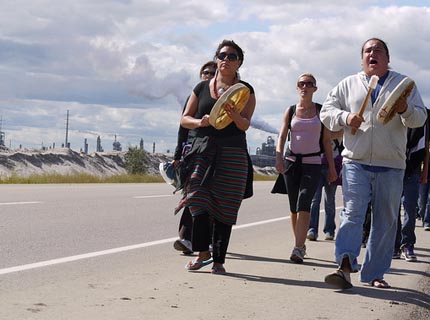The first time I heard of the Koch brothers, I was out for beer with some friends I hadn’t seen since high school. We were sharing what we’d been up to, and one of them looked at me (the enviro) oddly as he said he now had his own company, but he’d been previously working for Koch Industries.
Intrigued, I asked him what Koch Industries did. He looked at me like I was a half-wit and said “Evil, man. That’s what they do.”
My ignorance could perhaps be forgiven, given that this was before the Greenpeace U.S. investigative report was published on how Koch Industries — an oil company that is the second-largest privately held company in the United States — had quietly become the “financial kingpin of climate science denial and clean energy opposition” through its funding of lobbyists, think tanks, and “astroturf” (fake grassroots) campaigns.
It was before the stunning expose in the New Yorker on how the Koch brothers — who own virtually all of Koch Industries and who are both on the list of the 10 richest people in the United States — were pumping millions into right-wing groups across the U.S. in a “covert operation” against government regulation in general, and the Obama administration in particular. This included kick-starting the Tea Party as “a grassroots citizens’ movement brought to you by a bunch of oil billionaires.”
It was also before I knew that they were big players in the Canadian tar sands, and poised to be one of the major beneficiaries of the proposed new Keystone pipeline to carry bitumen from the tar sands to U.S. refineries.
So a collective shudder went through the Canadian environmental movement when we learned that they are planning to make their presence, potentially backed by millions of dollars, felt north of the border. To date, we only know about the $175,000 they have donated to Canada’s own climate change-denying Fraser Institute since 2005. But the big news last week is that they have now formally registered as lobbyists in Alberta and in Ontario.
Why are the tentacles of the “Kochtopus” heading north now?
Probably for the same reason that the Harper government handed over $15 million and seconded their top “mechanic” (the now in-disgrace Bruce Carson) to organize the oil patch politically. And why the oil companies are spending millions on pro-tar sands television and full-page newspaper advertisements.
It’s because they fear that the campaign by environmental groups and First Nations against the rapid expansion of the tar sands is gaining traction.
One of the things that the Koch brothers want to block is a Low Carbon Fuel Standard, like the one already in place in California and which is moving ahead in Europe. Such a regulation would discourage investment in oil from the tar sands, which requires a lot more energy to process than conventional oil and therefore results in significantly higher greenhouse gas emissions per barrel (23 per cent more life-cycle emissions, according to the EU).
The pro-tar sands campaign in Europe has been particularly aggressive, in spite of the fact that no one imagines that Europe will import significant amounts of oil from the tar sands any time soon. What the oil industry fears is the “threat of a good example,” i.e. that these rules might spread to other jurisdictions. The Harper government, to its discredit, is allowing itself to be used as their club against these measures that would benefit the climate, albeit at the expense of oil company profits.
The EU, to its credit, has not backed down even though it is not just standing up to the Canadian government (arguably not that difficult), but also to its own oil companies (U.K.-based BP and Shell, along with France’s Total and Norway’s Statoil). The major European oil companies are now following their North American cousins into the tar sands, as they lose access to reserves of conventional oil.
Indeed, it is precisely because they recognize that the world is running out of easy-to-get oil (especially within Europe itself) that the Europeans are beginning to look seriously at how to go beyond oil and into a future where we meet our energy needs efficiently and with renewable energy.
That possible future represents a threat to oil company profits, but it shouldn’t be seen as a threat to Canada (unless you imagine Canada is somehow immune to the impacts of climate change).
How does this relate to the Koch brothers? Well, since Koch Industries refines about a quarter of the oil imported from the tar sands into the United States, Low-Carbon Fuel Standards (which are simply one way of nudging us in the direction of breaking our addiction to oil) are a significant threat to their bottom line.
And as the Canadian tar sands (and Arctic drilling) loom ever larger in the business plans of private oil companies, it looks like the Koch brothers are looking to protect their investments here.
For Canadian environmentalists, dealing with a well-organized campaign by some of the most powerful corporations on the planet probably won’t be a lot of fun, but it sure beats being ignored.
And with the Koch brothers preparing to enter the fray, get ready for a whole new bag of dirty tricks in defence of dirty oil.
Keith Stewart is an Energy and Climate Campaigner with Greenpeace Canada.



